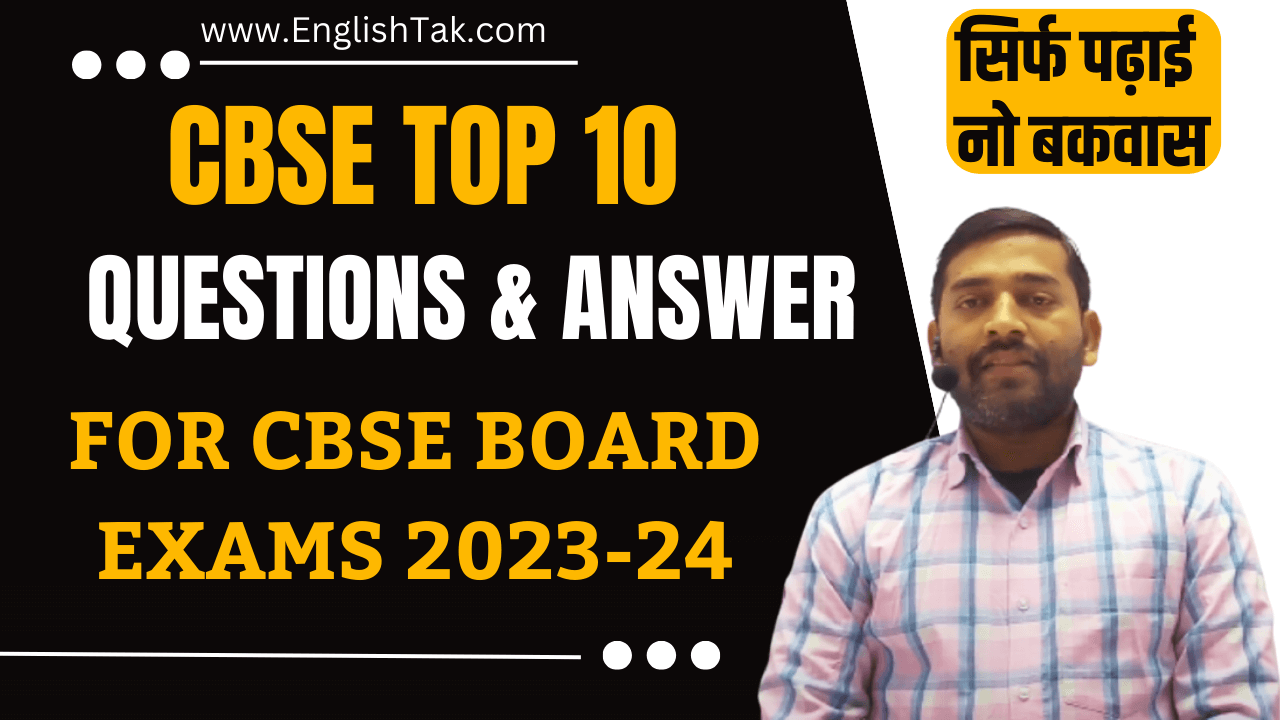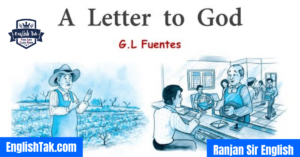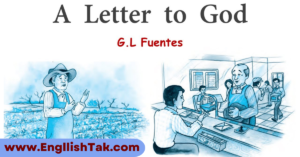![]()
Top 10 Long Questions Answers for 10 Board 2023-24
Table of Contents
Top 10 Long Questions Answers for 10 Board 2023-24 – In this post, I am sharing Top 10 Long Questions Answers for 10 Board 2023-24 which may be asked in the CBSE Class 10th Board Exams in 2023-24. Let’s start…
Top 10 Long Questions Answers for 10 Board 2023-24
1. Describe Lencho’s qualities in light of his faith in God. Do you have faith in God like Lencho? Was Lencho’s reaction towards post office employees right? [CBSE 2015]
Ans. Lencho was a destitute peasant whose crops were totally destroyed due to the heavy hailstorm. He had to suffer a huge loss due to it. He was petrified of the fact that he and his family would have to spend the entire year hungry as they had nothing to survive on. In the moment of despair, his only ray of hope was God. He believed that God would help him in this plight. He had firm faith in God and believed that God would not let him and his family die of hunger.
Yes, I do have a strong belief in God like Lencho. I believe that God is the only one who never disappoints a person at the time of predicament. Lencho’s reaction towards the post office employees was not right. He suspected them of being ‘crooks’ who had stolen the money but in fact, it were the post office employees only who had helped Lencho by donating their share of money for him.
2. What were the contents of the letter Lencho wrote to God? What does it show about him? [Delhi Gov. QB 2022]
Ans. Lencho wrote a letter to God in desperation. He felt hopeless after the hailstorm ruined his crop. Lencho had immense faith in God and he was confident that God would help him. He wrote a letter and mentioned his plight. He asked God to send him 100 pesos so that he would live till the next year and also he would be able to sow the next crop. Lenchho was a man of faith. He was a believer. He really believed that God would not refuse to help him. It shows his pure faith and determined spirit.
3. Critically examine ‘apartheid’ as “an extraordinary human disaster” according to Nelson Mandela.
Ans. When Mandela mentions “an extraordinary human disaster” at the beginning of his speech, he refers to the racial discrimination policy named ‘apartheid’ that was introduced by the white-skinned people of the country. According to that policy, the dark-skinned people of the country were not provided any freedom or civil right as an equal native like the ‘whites. The ‘black’ people had to suffer severely due to this policy. They were subjected to oppression for long. They were not even allowed to discharge their obligations to their own families, community or country. White people had no compassion for them. They even arrested several black people and put them in prisons when they fought for freedom.
4. In a parallel world, the pilot of the black aeroplane narrates his adventure in a story titled ‘The Old Dakota’. You come across an excerpt from the story, which responds to the ending questions of ‘Black Aeroplane’ and describes the black aeroplane pilot’s decision to fly away after watching the Dakota land. Compose the said excerpt of the story employing relevant details from ‘Black Aeroplane’. [CBSE Question Bank 2021]
Ans. The pilot of the old Dakota looked helpless as he was stuck in the storm. One could tell from the pale face of the pilot that he was clueless about the location of his plane. As I decided to help him, I moved towards the side of his plane. I turned my face towards the pilot of Dakota and raised my hand as a signal to follow me. The pilot followed me to the nearest airport. I was excited to meet the pilot of Dakota as soon as we would land. But when the old Dakota was about to land, I received an urgent message from the Control Room. There was an emergency landing of Boeing 655 on water due to the bad weather. I was asked to be the part of the rescue team for the same, as my technologically advanced black aeroplane was laden with strong equipment to deal with such kind of situations. Hence, I flew away without meeting the pilot of old Dakota. I was content at the fact that the pilot safely made it to the airport.
5. The pilot of old Dakota says-“I went and asked a woman in the control centre where I was and who the other pilot was. I wanted to say ‘Thank you’. She looked at me very strangely, and then laughed.” Evaluate the incident based on your reading of ‘The Black Aeroplane’.
Ans. When the pilot of Dakota was about to land, he turned back to see the black Aeroplane but it was nowhere to be seen. After landing, he went to the control centre of the airport to ask the women in-charge about the mysterious black aeroplane. He wanted to thank the pilot who guided him out of the storm. However, the woman in charge looked at him strangely and laughed at him. She told him that there was no other plane flying except his, on such a stormy night. His was the only plane spotted on the radar. The pilot was left wondering as to who helped him. It always remained a mystery for him.
Related Posts
6. The parents of the young seagull appears to be very harsh. Do you agree? [Diksha]
Ans. Yes, I agree but it was all meant to teach him how to fly. There is no doubt about the fact that ‘All parental acts are for the betterment of the children’. It is the ardent wish of every parent that they may teach all skills to their young ones so that they may succeed in life. First of all, they can learn all the things which their parents have gone though in life. If the young ones don’t act properly then the parents also indulge in scolding, taunting and humiliating them to shed off their hesitations and fears. This is exactly what the parents of the young seagull did. They were successful in teaching the art of flying to his siblings. They also tried their best to make him to take the plunge. Particularly, the mother-seagull went on flying around him with a piece of fish in her beak. It was her attempt to tempt her starving son to dive at the fish. And she succeeded in her aim. The young seagull did dive at the fish and it led to his first flight.
7. Anne decided to write a brief description of her family and her childhood. Evaluate with reference to the story ‘From the Diary of Anne Frank’.
Ans. Anne decided to write a brief description of her family and her childhood to make people aware of what she was talking about in the diary. If she plunged right into her stories, nobody would understand her characters. She describes her father as an ‘adorable’ man who married her mother, Edith Hollander Frank. She talks about her elder sister, Margot Frank and her grandmother. Her parents emigrated to Holland in 1933 leaving Margot and Anne with their grandmother in Aachen. Later, both the sisters joined their parents when their parents were settled in Holland.
8. Anne was different from other girls of her age. Substantiate the statement with reference to the lesson, “From the Diary of Anne Frank”.
Ans. She was very intelligent and had a sharp brain. She could think clearly and insightfully and had deep thoughts and ideas which she wanted to share with someone. She found that her friends were unable to understand her completely. Their mental wave length did not match with that of Anne’s. They could only talk to Anne about the ordinary everyday matters. She had a loving family and friends but could not share her deep thoughts with anyone thus, she got her diary ‘kitty!.
9. In the chapter, ‘A Baker from Goa’ the narrator talks about his childhood in Goa and his fond memories. Compare the childhood of Nelson Mandela with that of the narrator. [CBSE Question Bank 2021]
Ans. Both the characters in the two chapters remember their good childhood days when things were simple and loving. In the chapter, ‘A Baker from Goa’, the author fondly remembers that when he was young, a baker used to visit his street twice. Once in the morning, when he was to start selling the bread and then in the evening while returning after selling all his bread. The children used to run listening to the jingling thud of his bamboo stick. They wanted to get sweet bread bangles for themselves.
In the chapter, ‘Nelson Mandela: Long Walk to Freedom’, Mandela remembered that in childhood, the meaning of freedom for him was quite simple. It meant freedom to run in the fields, swim in the clear stream, roast mealies and ride the board backs of slow-moving bulls.
10. Mandela says :I learned that courage was not the absence of fear, But the Triumph over it.” Elaborate on the basis of your understanding and reading of Nelson Mandela long Walk to Freedom.
Ans. The decades of oppression and brutality by the white-skinned people of South Africa on the blacks, had an unintended effect on the lives of the black people. It produced freedom fighters like Oliver Tambos, Walter Sisulus, Chief Luthulis, Yusuf Dadoos, Bram Fischers and Robert Sobukwes. They were the men of great character but cruelty turned them into ferocious freedom fighters. They were extremely courageous people who took the lead to eradicate the racial discrimination from the country. Such ‘extraordinary courage’, wisdom and generosity may never be known to the nation again.
From those men, Mandela learned that courage did not mean the absence of fear but the victory over it. He believed that to be a brave man, one does not have to be fearless but should have the capability of conquering the fear by fighting against injustice.
English For CBSE Class 10th
Glimpses of India Class 10 MCQ Questions
From Diary of Anne Frank MCQ CBSE Class 10 English
Two Stories about Flying MCQ Class 10 CBSE English
CBSE Class 10 Maths Previous Year Papers





